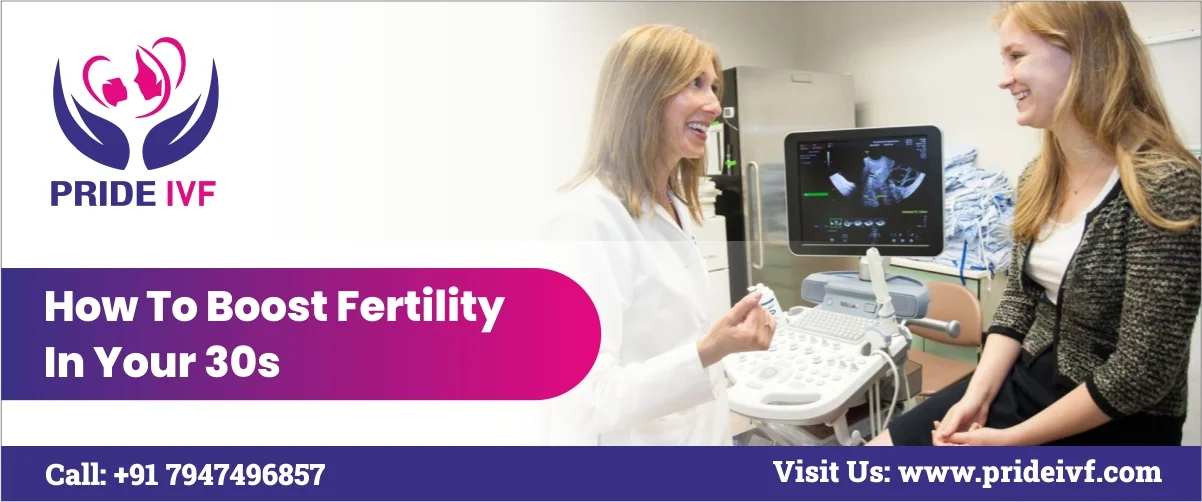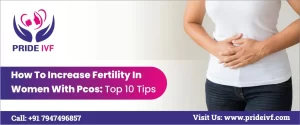As women enter their 30s, many start to think about their fertility and the possibility of starting a family. It’s a time when careers are often established, relationships are solidifying, and the desire for children becomes more prominent. However, female infertility is not something to be taken for granted, especially as we age. In this blog, we’ll explore practical tips for women in their 30s on how to boost fertility in your 30s naturally and increase their chances of conception.




Understanding Fertility in Your 30s
Fertility refers to the ability to conceive and carry a pregnancy to term. However, this ability tends to decrease as women age. The decline starts becoming noticeable in the late 20s and accelerates in the mid-30s.
Common misconceptions about fertility in your 30s include the belief that there’s plenty of time to start a family. While it’s possible to conceive during this time, it may not happen as quickly or easily as it would have in the 20s. Another misconception is the idea that fertility treatments are always effective. While they can help, they’re not guaranteed and can be costly.
It’s essential to have a realistic understanding of fertility in your 30s. It’s essential to have a realistic understanding of fertility in your 30s. Seeking support from healthcare professionals when needed is essential, especially when considering tips for getting pregnant 30-35.
Lifestyle Changes for Improved Fertility
Adopting healthy lifestyle changes can significantly improve fertility outcomes for women in their 30s, contributing to how to boost fertility in your 30s.
Diet and Nutrition
Maintaining a balanced diet rich in essential nutrients is crucial for supporting fertility. Include plenty of fruits, vegetables, whole grains, and lean proteins in your meals. Specific nutrients like folate, iron, and omega-3 fatty acids are particularly beneficial for reproductive health. Incorporate foods like leafy greens, nuts, seeds, fish, and beans into your diet to ensure you’re getting these essential nutrients.
Exercise and Physical Activity
Regular exercise plays a significant role in enhancing fertility. Aim for a combination of aerobic exercises, strength training, and activities like yoga (fertility yoga poses) or Pilates. Aerobic exercises improve blood circulation, while strength training helps maintain a healthy weight and promotes hormone balance. Yoga or Pilates can reduce stress and improve overall well-being, which can positively impact fertility.
Stress Management
Stress can have a detrimental effect on fertility by disrupting hormone levels and menstrual cycles. It’s essential to find effective strategies for managing stress. Consider incorporating relaxation techniques such as meditation, deep breathing exercises, or mindfulness practices into your daily routine. Additionally, seeking support from a therapist or counselor can provide valuable tools for coping with stress and improving your emotional well-being. Prioritizing stress management can help create a conducive environment for fertility and increase your chances of conception. Also Read: how to increase fertility in women after 35
By prioritizing a balanced diet, regular exercise, and effective stress management techniques, women can optimize their fertility and increase their chances of conceiving naturally.
Lets get started
Optimizing Reproductive Health
Maintaining optimal reproductive health is vital for women in their 30s as they navigate their fertility journey.
- Regular Check-ups: Regular visits to a healthcare provider for reproductive health screenings are essential. These screenings help identify issues early and ensure timely intervention. Monitoring menstrual cycles is crucial for understanding hormonal balance and overall reproductive function.
- Healthy Habits: Avoid smoking, excessive alcohol consumption, and drug use. Maintain a healthy weight and avoid extremes, as obesity and being underweight can impact reproductive function. Prioritize healthy habits to create a supportive environment for fertility.
Understanding Your Menstrual Cycle
The menstrual cycle is a natural process that prepares a woman’s body for pregnancy each month. Ovulation, when the ovary releases an egg, typically occurs around the middle of the menstrual cycle. Tracking ovulation is key for couples trying to conceive. Methods like using ovulation predictor kits or monitoring basal body temperature can help determine the most fertile days. Timing intercourse during the fertile window, which includes the days leading up to and following ovulation, maximizes the chances of conception. Understanding and tracking your menstrual cycle can significantly enhance your chances of “how to boost fertility in your 30s”.
Seeking Professional Help
It’s important for couples to know when it might be time to seek help from a fertility specialist. Generally, if a couple has been actively trying to conceive for a year without success (or six months if the woman is over 30), it’s a good idea to consult a fertility specialist. Additionally, if there are known issues such as irregular menstrual cycles or a history of reproductive health issues, seeking help sooner rather than later can be beneficial. Also Read: At What Age Should A Woman Stop Trying To Conceive.
Fertility specialists offer a range of treatments and procedures to help couples overcome fertility challenges:
- Ovulation Induction: This treatment involves the use of medication to stimulate ovulation. It can be beneficial for women who are not ovulating regularly or are experiencing irregular cycles.
- Intrauterine Insemination (IUI): During IUI, sperm is directly inserted into the uterus during ovulation. This procedure can increase the chances of conception by placing sperm closer to the egg.
- In Vitro Fertilization (IVF): IVF is a more complex procedure that involves retrieving eggs from the ovaries, fertilizing them with sperm in a laboratory setting, and then transferring the resulting embryos into the uterus. It’s often recommended for couples with more significant fertility challenges.
In addition to these treatments, fertility clinics offer a range of other services to support couples on their fertility journey. These may include:
- Fertility Testing: Fertility clinics offer a range of tests to identify underlying issues that may be affecting fertility. These tests can help determine the most appropriate treatment plan.
- Genetic Screening: Some fertility clinics offer genetic screening to assess the risk of genetic disorders in embryos created through IVF. This can help couples make informed decisions about their fertility treatment options.
- Fertility Preservation: For individuals facing medical treatments that may impact their fertility, such as chemotherapy or radiation, fertility preservation techniques like egg or sperm freezing may be offered to preserve fertility for the future.
Couples need to research and discuss all available options with their fertility specialist to determine the best course of action for their unique situation. Understanding how to boost fertility in your 30s and incorporating appropriate treatments and procedures can significantly improve the likelihood of conception and successful pregnancy.
Conclusion
Taking proactive steps to support fertility in your 30s can increase your chances of conceiving and starting a family. With patience and the right support, many women in their 30s achieve their dream of parenthood. For expert guidance, consider International Pride IVF Centre in Delhi and Research Centre. Their experienced team offers personalized care and cutting-edge treatments. Don’t hesitate to take the first step towards realizing your dream of having a family.




